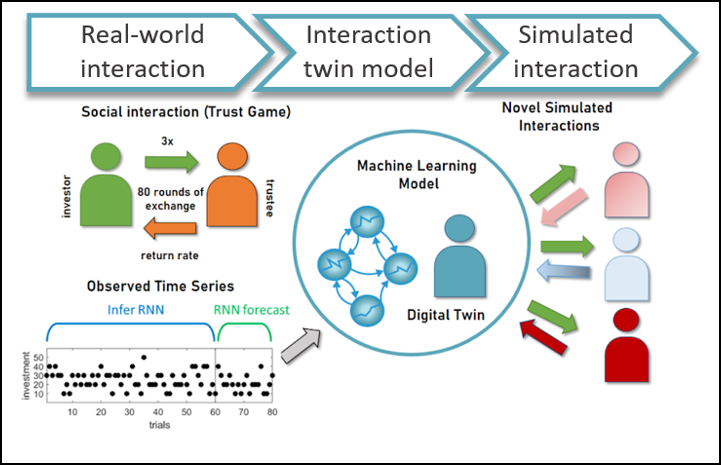Georgia Koppe
@GeorgiaKoppe
Professor for Scientific Computing @UniHeidelberg Reserach Group Leader @zi_mannheim HITKIP
Our new preprint compares naïve baselines, network models (incl. PLRNN-based SSMs), and Transformers on 3x40‑day EMA+EMI datasets. PLRNNs gave the most accurate forecasts, yielded interpretable networks, and flagged “sad” & “down” as top leverage points. doi.org/10.1101/2025.0…

We wrote a little #NeuroAI piece about in-context learning & neural dynamics vs. continual learning & plasticity, both mechanisms to flexibly adapt to changing environments: arxiv.org/abs/2507.02103 We relate this to non-stationary rule learning w rapid jumps. Feedback welcome!
📢 Early registration prices end tomorrow 15 April! 🚨 The 3rd Computational Psychiatry Conference is 14-16 July in Tübingen, Germany. cpconf.org Speakers inc. @PhilCorlett1 @CFraza Andreas Heinz @GeorgiaKoppe Jill O'Reilly @chandra_sripada Sophie Valk @torwager
Our revised #ICLR2025 paper & code for a foundation model architecture for dynamical systems is now online: openreview.net/pdf?id=Vp2OAxM… ... incl. add. examples of how this may be used for identifying drivers (control par.) of non-stationary processes. And please switch platform!
Interested in interpretable #AI foundation models for #DynamicalSystems reconstruction? In a new paper we move into this direction, training common latent DSR models with system-specific features on data from multiple different dynamic regimes and DS: arxiv.org/pdf/2410.04814 1/4
🚨Keynote speakers for the Computational Psychiatry Conference (14-16th July, Tubingen) announced 📢 Very excited to have excellent keynotes across theory-driven CP, machine learning, and clinical psychiatry: Andreas Heinz @GeorgiaKoppe @chandra_sripada Sophie Valk @torwager
We demonstrate that data-driven strategies can be effective in identifying behavioral contingencies and enhancing the personalized selection of digital interventions. Together with @DurstewitzLab @UReininghaus @HamidrezaJamal9 2/2

Can we use data-driven tools to guide the selection of ecological momentary interventions (EMI) to improve mental health? In this new study, we borrow concepts from control theory to personalize and optimize the selection of EMI. onlinelibrary.wiley.com/doi/pdf/10.100… 1/2

📢New work on hippocampal assemblies & theta! nature.com/articles/s4146… It was a pleasure to work with @AleksDomanski, Nadine, Tim, @kipp_freud, @DurstewitzLab, and Matt Jones (@SleepDetectives). @SantAnnaPisa @BristolNeurosci @zi_mannheim @BernsteinNeuro 🧵[1/11]
Interested in interpretable #AI foundation models for #DynamicalSystems reconstruction? In a new paper we move into this direction, training common latent DSR models with system-specific features on data from multiple different dynamic regimes and DS: arxiv.org/pdf/2410.04814 1/4
We show applications like transfer & few-shot learning, but most interestingly perhaps, subject/system-specific features were often linearly related to control parameters of the underlying dynamical system trained on … 2/4
This gives rise to an interpretable latent feature space, where datasets with similar dynamics cluster. Intriguingly, this clustering according to *dynamical systems features* led to much better separation of groups than could be achieved by more trad. time series features. 3/4
Fantastic work by the incomparable @brenner_manuel and Elias Weber, together with @GeorgiaKoppe! 4/4
Creating digital twins of social interaction behavior with #AI! Our study shows how generative models can predict interactions from limited data, revealing hidden dynamics. Together with @brenner_manuel @DurstewitzLab. Explore: osf.io/preprints/psya… #DigitalTwin #SocialBehavior

Just wanted to stop by & say: We have 2 new accepted #NeurIPS2024 papers: 1) @brenner_manuel , Hemmer, @Zahra__Monfared, DD: Almost-Linear RNNs Yield Highly Interpretable Symbolic Codes in Dynamical Systems Reconstruction --> *this takes DSR to a new level!*, details to follow
2) Volkmann, Brändle, DD, @GeorgiaKoppe: A scalable generative model for dynamical system reconstruction from neuroimaging data --> efficiently scales up fMRI analysis with generative DSR models! Again, details to follow ...
Are you a mental health practitioner curious about how our 'Experience Sampling' tool can enhance your practice? Watch the info video below to learn more! youtu.be/YbAJH-NJR1Y
We won the 2024 VBHC award for collaboration! Dr. Weermeijer and Drs. Bonnier received it on behalf of the entire consortium. Huge thanks to our IMMERSE colleagues, the Value Based HealthCare Centre, and all our participants, clinicians, and advisory board members. 🏆 #VBHC